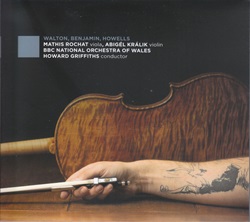Herbert Howells Elegy ist ein durch und durch britisches Werk und eine hoch emotionales Hommage an einen Freund des Komponisten, der 1916 im Krieg gefallen war. Der Schweizer Bratschist Mathis Rochat entlockt seinem Instrument einen vollen, warmen Klang. Zusammen mit dem Quartett und dem Orchester gestaltet er das Stück sehr suggestiv.
William Walton schrieb sein Bratschenkonzert mit 26 Jahren, und es war Paul Hindemith, selbst ein großer Bratschist, der das Konzert aus der Taufe hob und zu einer Sensation machte. Einerseits überzeugt die Tiefe und Reife der Komposition, andrerseits gibt Walton der Musik einen schwelgend-spätromantischen Charakter, der gerade von der Bratsche optimal gestaltet werden kann.
Mathis Rochat entdeckt in diesem gewiss schwierigen Werk so viel an Farbe, an Kontrasten und innerer Spannung, ja er legt vor allem im ersten Satz so unglaublich viel in die Aussage der Musik, dass wir es neu erfahren. Der zweite Satz ist stupend virtuos und das Finale angenehm tänzerisch.
An dieser Wirkung ist Howard Griffiths Mstislav Rostropovich stark beteiligt. Er agiert in völliger Übereinstimmung mit dem Solisten und inspiriert das Orchester zu einer stimmungsstarken Interpretation.
Die Romantische Fantasie für Violine, Bratsche und Orchester des britisch-australischen Komponisten Arthur Benjamin (1893-1960) entstand im Jahr 1936 und wurde durch die Aufnahme mit Jascha Heifetz und William Primrose bekannt. Diese neue Einspielung ist sehr expressiv. Die Solisten wissen genau, wann sie ihr Spiel kontrastreich oder eher verschmolzen präsentieren müssen.
Herbert Howell’s Elegy is a thoroughly British work and a deeply emotional tribute to a friend of the composer who was killed in the war in 1916. Swiss violist Mathis Rochat elicits a full, warm sound from his instrument. Together with the quartet and the orchestra, he creates a highly evocative piece.
William Walton wrote his viola concerto at the age of 26, and it was Paul Hindemith, himself a great violist, who premiered the concerto and turned it into a sensation. On the one hand, the depth and maturity of the composition is convincing; on the other, Walton gives the music an indulgent, late-romantic character that can be optimally shaped by the viola.
Mathis Rochat discovers so much color, contrast and inner tension in this certainly difficult work, indeed he puts so much into the music’s message, especially in the first movement, that we experience it anew. The second movement is stupendously virtuosic and the finale is pleasantly dance-like.
Howard Griffiths is heavily involved in this effect. He acts in complete harmony with the soloist and inspires the orchestra to an interpretation full of atmosphere.
The Romantic Fantasy for violin, viola and orchestra by the British-Australian composer Arthur Benjamin (1893-1960) was written in 1936 and became famous through the recording with Jascha Heifetz and William Primrose. This new recording is very expressive. The soloists know exactly when to present their playing in a contrasting or rather fused manner.



















